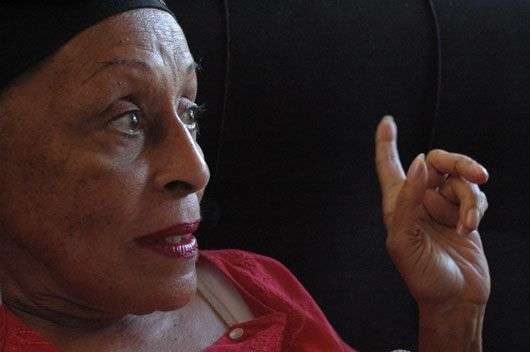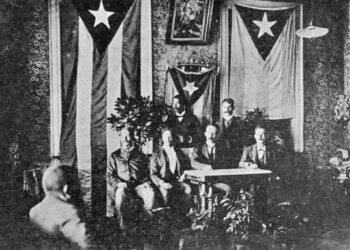Omara Portuondo is synonymous of the song; many consider her the greatest Cuban singer and a symbol of our culture. Omara Portuondo Peláez , as parents her baptized her, was born in the neighborhood of Cayo Hueso, Havana, on October 29, 1930 under the star of those meant to leave a mark that defies the passage of time .
Her first appearance was as an amateur in Radio Cadena Habana, debut that opened her the door for integrating prestigious groups of the time like the Orlando de La Rosa quartet, the Loquibambia group, along with Frank Emilio Flynn and José Antonio Méndez , and D’ Aida , under the wise leadership of Aida Diestro.
With over 80 years she has a contagious vitality and way to value every minute of life are a sample of the fiber that makes up this great woman.
On some of the most important moments of her life and immediate plans, Omara Portuondo spoke with OnCuba .
Who caught who, you to music or vice versa?
It all started at home, listening to my parents sing together, from that stage is my admiration for Maria Teresa Vera and others.
I begin to sing back in the 40s, at that time I met Elena Burke, pianist Frank Emilio Flynn, and Niño Rivera, also the great composer Orlando de la Rosa. It was then they started calling me The Feeling Bride.
How did you arrive to the D ‘Aida?
My sister Haydeé and I went to see Amaury Pérez father who ran the television program the Noon Show, with the idea of being hired as a duo, but we found Elena, who was also looking for work, and came up with the idea of forming a quartet.
Elena looked for Aida Diestro, who had experience running such formations and rounded the idea of a quartet. Thus began the D’Aida, early 50s, made of by my sister, Elena, Moraima Secada and me.
To speak of Cuban music in the last 50 years is inevitable to mention its name. People and times of national cultural life are tied to your voice inextricably. Tell us about them…
I do not know where to start; I think I would start by D’Aida. Elena Burke sang as none, Moraima was amazing; she got deep into each song and gave it a twist.
I remember fondly the stage of the Nueva Trova, Silvio always liked “The era is giving birth to a heart”. I also sang, by Juan Formell, “Perhaps”, one of my favorites.
An author who has marked my existence is Alberto Vera, to him belongs Amigas, a symbol of friendship between Moraima, Elena and me.
Omara, you have the privilege of being part of one of the biggest phenomena in Cuban music, Buena Vista Social Club, how do you remember that project?
The Buena Vista Social Club is one of the many “All Stars” the Cuban music has had. In the same group were Ruben Gonzalez, Compay Segundo, Ibrahim Ferrer, Pio Leyva, Manuel Galván, Eliades Ochoa, and others.
That was in 1996 and studies released the CD Buena Vista Social Club, which gathered so much attention.
Because of the success with the Buena Vista you have maintained very interesting personal projects …
Yes, over the years I have continued recording and working hard, with results that fill me with joy. I’ve made records with Chucho Valdes, someone very important in my life, and for children, a very comforting for me personally and to my professional life. Also the CD Thanks, which was awarded the Latin Grammy in 2009.
CUBADISCO recently gave me a Special Award for the album My Longings, a dream come true because I turned the desire to sing a duet with outstanding performers who I always admired.
Most of them are of Cuban music icons as Barbarito Diez, Miguelito Cuni, Bola de Nieve , among many others , I also share with Nat King Cole , Vicente Garrido and Josephine Baker; artists who passed through the island at the height of their careers .
Now I work in the remake of Black Magic, record that I made on my solo debut in the late 50s.
Still no name, this is a detail I left for last.
After so many years dedicated to singing, which themes have marked you in a special way?
Undoubtedly Twenty years by María Teresa Vera, La Bayamesa, a beautiful song I learned as a child, and Gray Afternoons, a song that reminds me of Elena Burke because she loved it, the two by Sindo Garay.
Omara, you are a symbol of Cuba, your presence in other latitudes scenarios translates to your compatriots in one of the best ways to be represented, to be there…
As Van Van would say: and what do you think? It is a great honor to represent my beautiful land, but more than that is a must. Cuban artists enjoy great admiration and respect, and that’s almost a tradition.
This Island is the most musical in the world, defend it with the song is the greatest opportunity that has been given me to serve it.










